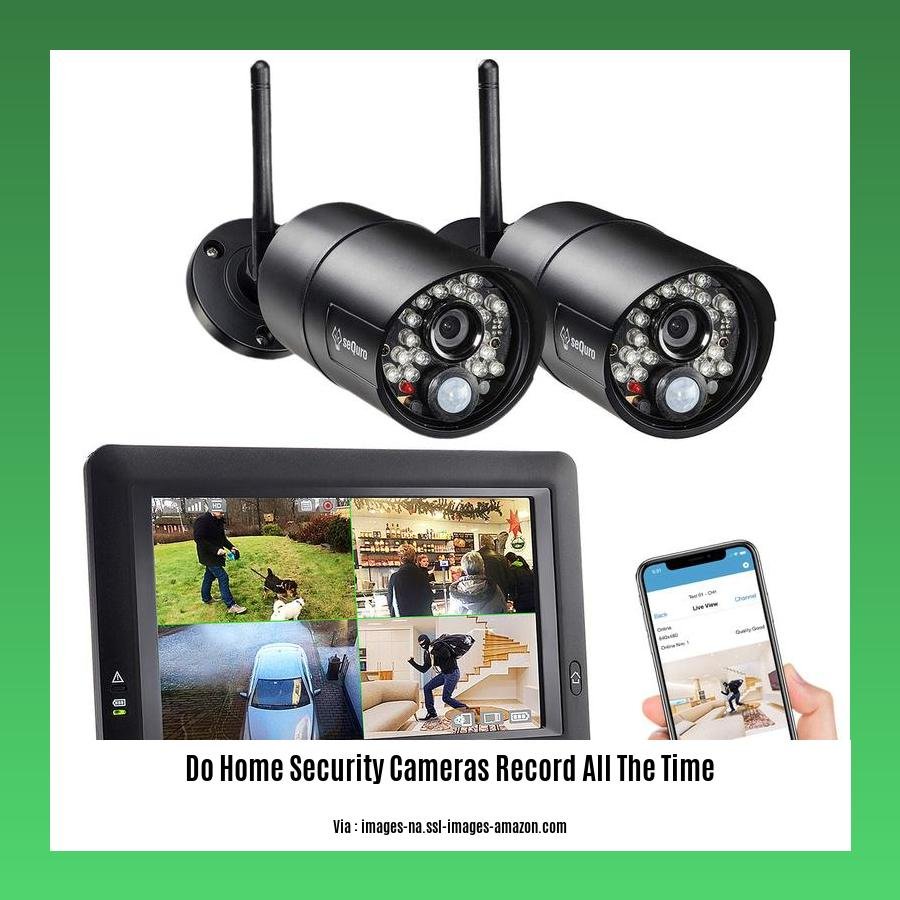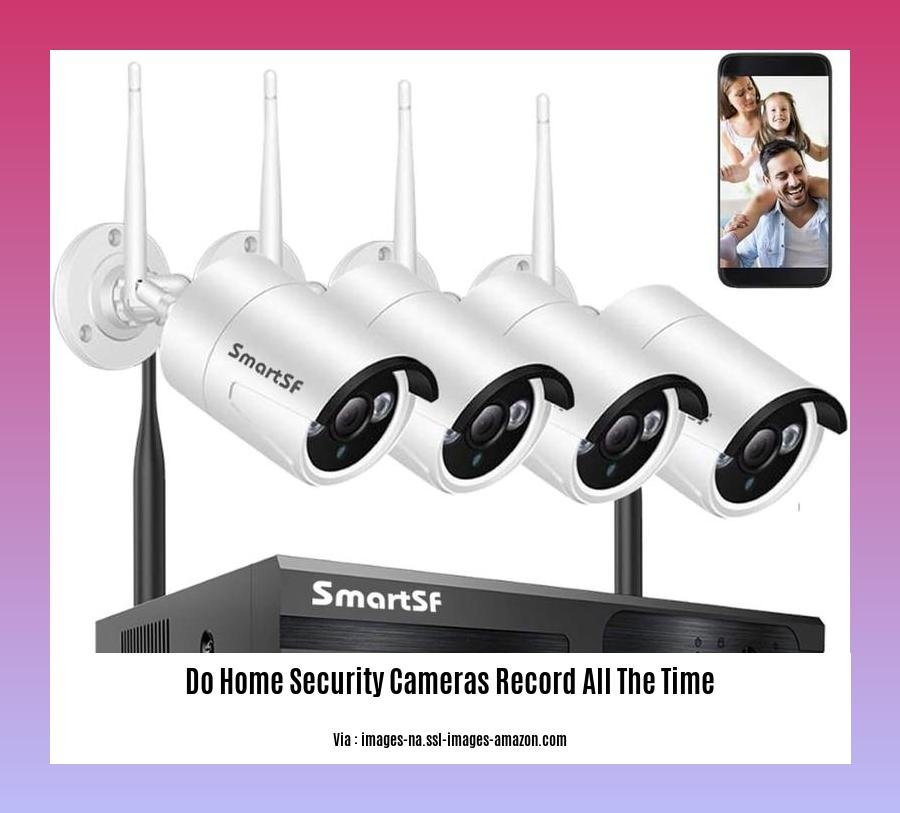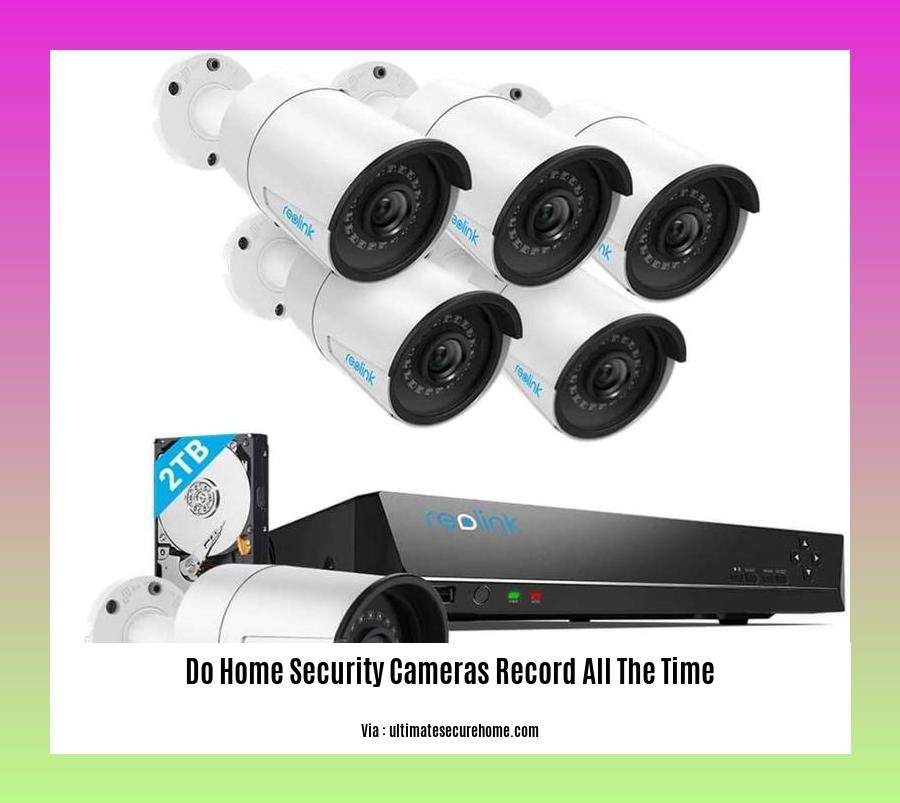Do Home Security Cameras Record All the Time? Answering this question involves delving into the intricacies of home security camera systems, their recording capabilities, and the factors that influence their recording behavior. Some cameras offer continuous recording, while others record only when triggered by motion or sound detection. Understanding these distinctions is crucial for homeowners seeking a comprehensive security solution that meets their specific needs and ensures the protection of their property.
Key Takeaways:

- Most home security cameras do not record all the time.
- Different recording modes provide flexibility for users to adjust recording preferences.
- Continuous recording takes up more space but may not be necessary due to advanced motion detection capabilities.
- Some cameras connected to a DVR or NVR may offer 24/7 recording.
- Cameras with only online or cloud storage may only record when motion is detected.
Do Home Security Cameras Record All the Time?
In the realm of home security, a common question arises: do home security cameras record all the time? Unraveling this query requires a comprehensive understanding of the diverse types of security cameras, their recording capabilities, and the factors influencing continuous recording.
Uninterrupted Surveillance: Continuous Recording
Continuous recording, a hallmark of some home security cameras, entails capturing footage 24/7. This uninterrupted surveillance offers several advantages, including the ability to capture every moment, regardless of motion detection triggers. Continuous recording provides a comprehensive record of events, enhancing security and potentially aiding in investigations.
Motion-Activated Recording: A Strategic Approach
Alternatively, motion-activated recording offers a more targeted approach, capturing footage only when movement is detected within the camera’s field of view. This recording mode conserves storage space by only storing relevant footage, minimizing the need to review hours of uneventful recordings.
Factors Influencing Continuous Recording
Several factors determine whether a home security camera can record continuously:
-
Storage Capacity: Continuous recording requires ample storage space, as vast amounts of footage are generated. Cameras with limited storage may only record for a few days before overwriting old footage.
-
Power Supply: Cameras designed for continuous recording require a reliable power source, as they operate 24/7. Batteries may not provide sufficient power, necessitating a wired connection.
-
Data Transmission: Continuous recording generates substantial data, potentially straining network bandwidth and incurring higher data usage charges.
Legal and Privacy Considerations
Continuous recording raises legal and privacy concerns, particularly in areas with strict video surveillance laws. It’s crucial to adhere to local regulations and ensure that continuous recording doesn’t violate the privacy rights of others.
Choosing the Right Camera for Your Needs
Selecting a home security camera that aligns with your specific needs is paramount. Consider factors such as the desired recording mode, storage capacity, power requirements, and legal considerations.
Additional Tips for Optimal Recording
-
Choose a camera with adequate storage capacity: To avoid frequent footage overwriting, opt for a camera with ample storage space, especially if continuous recording is desired.
-
Consider cloud storage: Cloud storage provides a secure and accessible backup for your recordings, ensuring they’re not lost in case of theft or damage to the camera.
-
Set up motion detection zones: Customizing motion detection zones allows the camera to focus on specific areas, minimizing false alerts and irrelevant recordings.
-
Configure recording schedules: To optimize storage space and battery life, schedule recording times to align with periods of activity or potential security risks.
In conclusion, understanding the nuances of continuous recording versus motion-activated recording, as well as the factors influencing continuous recording, empowers homeowners with the knowledge to make informed decisions about their home security needs. By carefully selecting a camera that aligns with their specific requirements and preferences, homeowners can ensure optimal security and peace of mind.
Disadvantages of Homeschooling
If the regular school system doesn’t work for your child, you may want to consider disadvantages of homeschooling to help make an informed decision.
Disadvantages of Homework
Due to the number of school closures caused by the pandemic, students are feeling the disadvantages of homework more than ever, find out why.
Disadvantages of Prefab Homes
Thinking about buying a prefabricated home? Make sure to consider the disadvantages of prefab homes to avoid potential pitfalls.
Discount Home Improvement Stores Near Me
Looking for ways to save money on home improvement projects? Check out a few discount home improvement stores near me for the best deals.
Legal and privacy considerations surrounding continuous recording:

Key Takeaways:
-
Continuous recording may capture sensitive or private information without the consent of the individuals involved.
-
Some jurisdictions have laws and regulations restricting the use of home security cameras, especially for continuous recording in public areas.
-
Legal and privacy considerations surrounding continuous recording: It’s important to research local and state laws governing video surveillance before installing a home security camera.
-
Know your neighbors! Continuous recording might capture footage of their property, leading to potential legal or privacy concerns.
-
Continuous recording raises privacy concerns, especially if the footage is stored remotely or shared online.
-
Continuous recording can be a privacy concern, especially if the footage is accessible to unauthorized individuals.
-
Ensure your home security camera system complies with local data protection and privacy laws to avoid legal issues.
Visualize this: Imagine yourself as the star of a home security camera reality show. Every move you make, every word you say, is being recorded and stored for posterity. It’s a bit creepy, right? That’s why it’s important to consider the legal and privacy implications of continuous recording before you install a home security camera.
Citations:
Factors affecting recording duration and storage capacity
Hey there, home security enthusiasts! Today, we’re diving into a burning question: do home security cameras record all the time?
The answer is… it depends! Let’s explore the factors that influence recording duration and storage capacity:
1. Storage Capacity:
Think of storage capacity as the film roll in an old-fashioned camera. The larger the roll, the more footage you can capture. Same goes for security cameras: more storage means longer recording times.
2. Recording Quality:
High-quality videos take up more storage space than low-quality ones.
3. Recording Mode:
There are two main recording modes:
- Continuous recording: This mode captures everything, like a 24/7 surveillance film.
- Motion-activated recording: This mode only records when motion is detected, saving storage space.
4. Loop Recording:
This feature allows cameras to continuously record, overwriting old footage once storage is full. But it might erase important moments if an incident happens just before the loop starts over.
Key Takeaways:
- Storage capacity determines how long a camera can record before overwriting footage.
- Higher recording quality means shorter recording times due to larger file sizes.
- Continuous recording captures everything but requires more storage.
- Motion-activated recording conserves storage by only recording when needed.
- Loop recording allows continuous recording but risks overwriting crucial footage.
Citation:
- Understanding the Factors That Affect Security Camera Recording Time
Tips for choosing and setting up home security cameras for optimal continuous recording
When it comes to home security, continuous recording can provide peace of mind by capturing every moment, but it also raises questions about storage and privacy. To help you navigate these considerations, here are some key factors to keep in mind:
Storage capacity:
The amount of storage you need depends on the length of time you want to keep footage, the video quality, and the number of cameras you have. Continuous recording requires more storage, so it’s essential to choose a camera with enough capacity to meet your needs.
Video quality:
Higher video quality means larger file sizes. If you’re looking to save storage space, you can opt for lower-resolution video, but this may compromise the clarity of the footage. Find a balance between video quality and storage capacity that works for you.
Motion detection:
Motion detection is a great way to conserve storage space and battery life. When enabled, the camera will only record when it detects movement, which reduces the amount of footage you need to store. This can also help you focus on the most relevant events.
Placement:
The location of your camera is crucial for effective continuous recording. Choose areas with high foot traffic or potential security risks, such as entrances, windows, and driveways. Make sure the camera has a clear view of the area you want to monitor.
Power supply:
For continuous recording, you’ll need a reliable power source. Some cameras come with rechargeable batteries, while others require a wired connection. Choose a power option that suits your needs and ensures uninterrupted recording.
Security:
When using continuous recording, it’s essential to take security measures to protect your footage from unauthorized access. Use strong passwords, enable two-factor authentication, and consider encrypting your recordings.
Privacy considerations:
Continuous recording raises privacy concerns, especially if you’re monitoring areas where people have a reasonable expectation of privacy. Be mindful of local laws and regulations regarding video surveillance to avoid legal issues.
Key Takeaways:
- Continuous recording offers comprehensive monitoring but requires ample storage and a reliable power source.
- Motion detection conserves storage and battery life by recording only when movement is detected.
- Consider storage capacity, video quality, motion detection, camera placement, power supply, security measures, and privacy laws when choosing and setting up home security cameras for optimal continuous recording.
Relevant URL Sources:
- TechRadar: Do Home Security Cameras Record All the Time?
- eufy: Do Home Security Cameras Record All the Time? Solved!
FAQ
Q1: Do home security cameras record continuously?
A1: Typically, home security cameras do not record continuously due to storage constraints and privacy concerns. Most cameras offer different recording modes, allowing users to choose when and how the cameras record.
Q2: What are the benefits and drawbacks of continuous recording?
A2: Continuous recording captures footage at all times, providing comprehensive monitoring but requires more storage space and can be expensive. It may also raise privacy concerns, as it can potentially capture sensitive or private information.
Q3: How does motion-activated recording work?
A3: Motion-activated recording is a more common option for residential use. Cameras with this feature only record footage when movement is detected, conserving storage space and reducing privacy concerns.
Q4: Which recording mode should I choose?
A4: The choice between continuous recording and motion-activated recording depends on your specific security needs, budget, storage capacity, and privacy preferences. Continuous recording may be suitable for businesses or high-security areas, while motion-activated recording is often preferred for residential use.
Q5: What factors affect the recording time of surveillance cameras?
A5: Factors such as storage capacity, recording quality and resolution, recording mode, and loop recording settings can influence the recording time of surveillance cameras. Higher resolution and quality settings, continuous recording, and shorter loop recording periods generally result in shorter recording times.
- Decorative Wall Tiles for Kitchen: Stylish Design Ideas - November 29, 2025
- Decorative Wall Tiles: Style Your Home with Unique Designs - November 28, 2025
- Best Color Backsplash For White Cabinets: Ideas Youll Love - November 27, 2025










